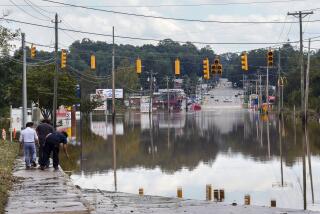Storms Soak Parts of Southeast, Give Little Relief
New thunderstorms on Saturday soaked parts of the Southeast, but they were too little and too late for towns short on water, hydroelectric plants with low reservoirs and farmers with devastated crops and no hay to feed their cattle.
Agricultural losses were put at $1.9 billion, and the deaths of 45 people have been blamed on an accompanying heat wave that is producing highs in the 90s after two weeks of highs in the 100s.
“We’re expecting the dry, hot weather to return (this) week,” said David Smith, an agricultural meteorologist in North Carolina.
A severe thunderstorm watch was posted Saturday for parts of drought-stricken Maryland, Virginia and North Carolina. In six hours overnight, more than an inch of rain fell on Athens, Ga., and on Montgomery, Ala., and 2.4 inches flooded some streets in Wilmington, N.C., a coastal city that is not in an agricultural area.
Most of Region Parched
While most of the Southeast is parched, coastal communities in North Carolina have had plenty of rain, and Wilmington is above normal for July, a National Weather Service meteorologist said.
Atlanta received more than an inch of rain late Friday, but rainfall in the city is still more than 14 1/2 inches below normal for the year. Outdoor watering restrictions were imposed last week.
Georgia’s lower Chattahoochee River has become nearly unnavigable to fully loaded barges making the trip from northern Florida to Columbus, Ga., and port operators in that city say they may shut down until next year, idling barge crews.
Flovilla, Ga., warned residents it would turn off its water system for part of the afternoon Saturday and today to conserve water.
Hydroelectric generation “is easily cut 50% statewide, and that’s a conservative estimate,” said Michael W. Burnette, an electrical engineer with North Carolina’s Utilities Commission.
Tons of free hay have been moved into the Southeast in recent days from farmers in several states across the nation.
More to Read
Sign up for Essential California
The most important California stories and recommendations in your inbox every morning.
You may occasionally receive promotional content from the Los Angeles Times.










